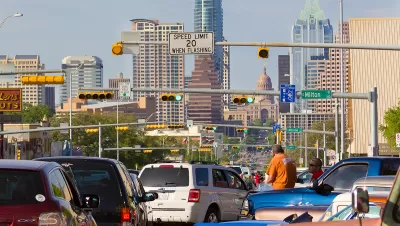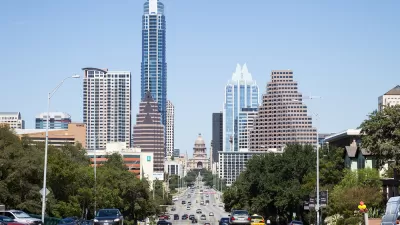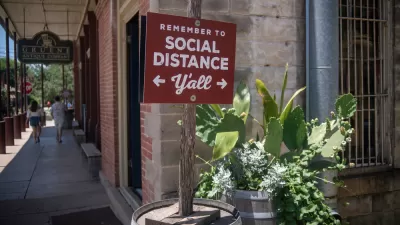The city of Austin's political leadership has proposed a package of competing bond proposals to raise money for large congestion relief measures in the fast-growing city.

An editorial by Alberta Philips explores some of the rhetoric behind a recent $720 billion bond proposal for the city of Austin, championed by Mayor Steve Adler. The editorial mostly digs into the scope of the bond, proposed to overhaul "key traffic corridors" in and around the city.
When he announced the $720 million bond package at the end of May, according to Philips, Mayor Adler claimed it was "time to 'go big or go home.'" The bond backs up that big talk by providing funding for the so-called Smart Corridor initiative. Philips also identifies a proposal by State Senator Kirk Watson to overhaul Interstate 35 as another example of the big thinking that presents "a remarkable opportunity to do something about their transportation predicament."
Philips's argument holds off on defining how the city should build bigger to solve Austin's congestion woes—first arguing that competing bond proposals by Austin city councilmembers are "too small to get the job done." One proposal, supported by City Councilmember Ann Kitchen and the city's mobility committee, would raise $300 million. City Councilmember Greg Casar backs another bond proposal that would spend $720 million, but has a "too small geographical reach and vision," according to Philips.
Only at the end of the editorial does Philips lay out the vision of what building bigger should look like, revealing a multi-modal, technology-enabled streetscape.
FULL STORY: Mayor says go big on transportation, but colleagues go small

Alabama: Trump Terminates Settlements for Black Communities Harmed By Raw Sewage
Trump deemed the landmark civil rights agreement “illegal DEI and environmental justice policy.”

Study: Maui’s Plan to Convert Vacation Rentals to Long-Term Housing Could Cause Nearly $1 Billion Economic Loss
The plan would reduce visitor accommodation by 25% resulting in 1,900 jobs lost.

Why Should We Subsidize Public Transportation?
Many public transit agencies face financial stress due to rising costs, declining fare revenue, and declining subsidies. Transit advocates must provide a strong business case for increasing public transit funding.

Paris Bike Boom Leads to Steep Drop in Air Pollution
The French city’s air quality has improved dramatically in the past 20 years, coinciding with a growth in cycling.

Why Housing Costs More to Build in California Than in Texas
Hard costs like labor and materials combined with ‘soft’ costs such as permitting make building in the San Francisco Bay Area almost three times as costly as in Texas cities.

San Diego County Sees a Rise in Urban Coyotes
San Diego County experiences a rise in urban coyotes, as sightings become prevalent throughout its urban neighbourhoods and surrounding areas.
Urban Design for Planners 1: Software Tools
This six-course series explores essential urban design concepts using open source software and equips planners with the tools they need to participate fully in the urban design process.
Planning for Universal Design
Learn the tools for implementing Universal Design in planning regulations.
Smith Gee Studio
Alamo Area Metropolitan Planning Organization
City of Santa Clarita
Institute for Housing and Urban Development Studies (IHS)
City of Grandview
Harvard GSD Executive Education
Toledo-Lucas County Plan Commissions
Salt Lake City
NYU Wagner Graduate School of Public Service




























